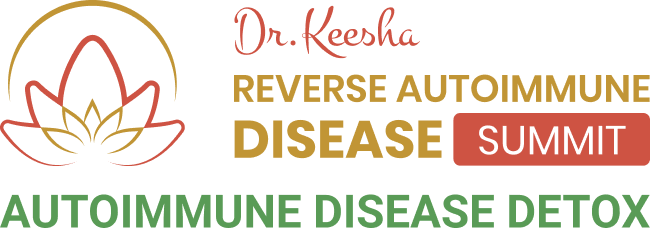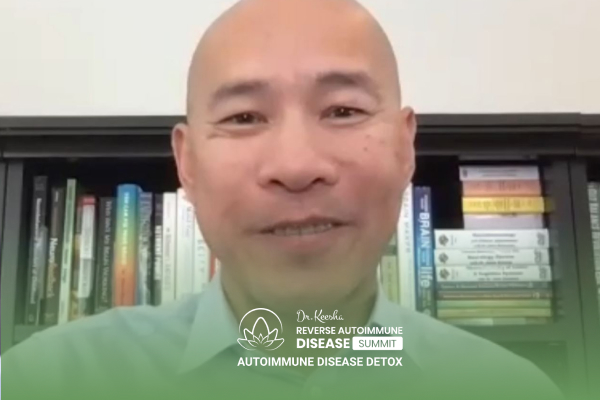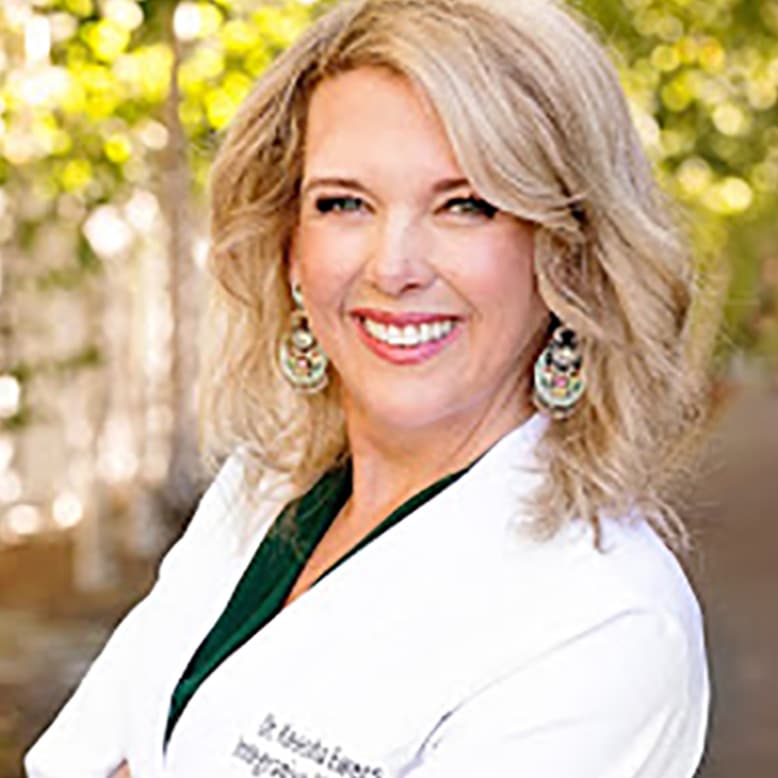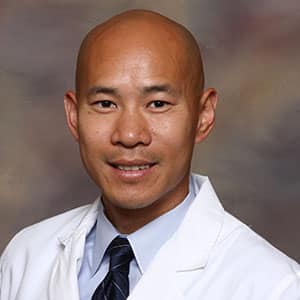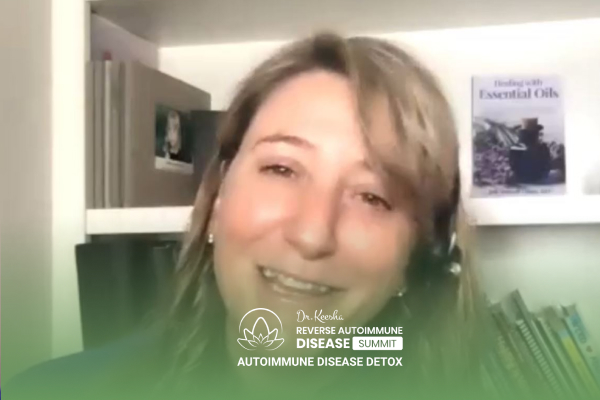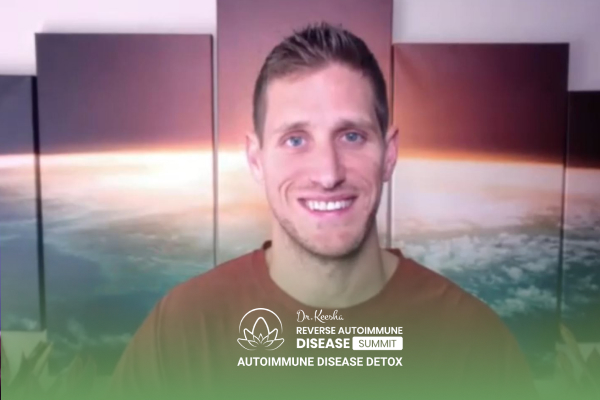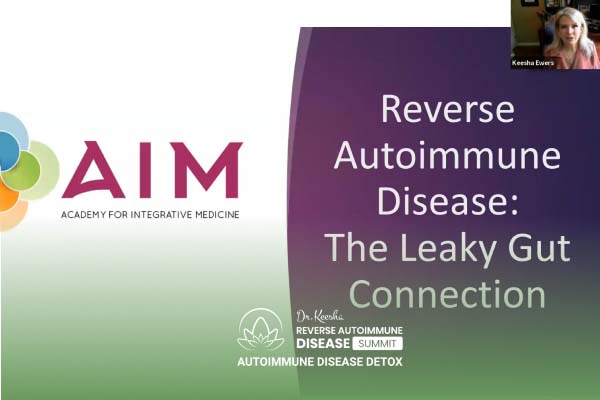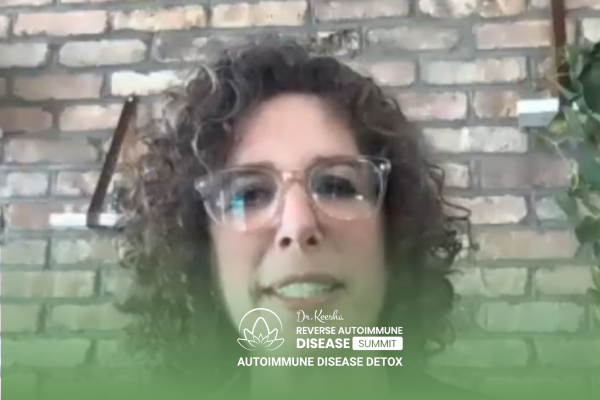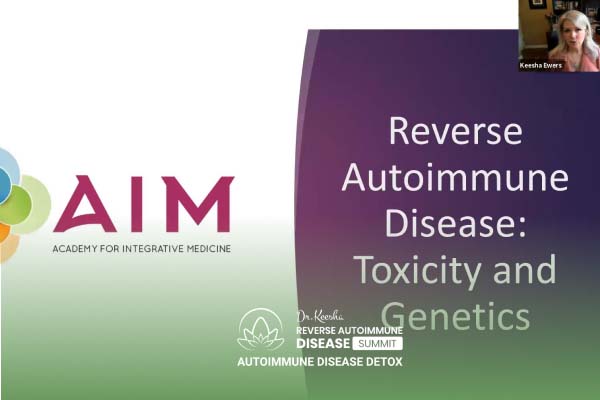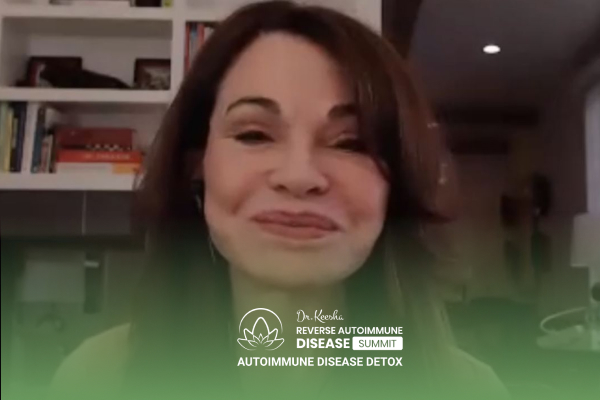Peter Kan, D.C., D.A.C.N.B., F.A.A.I.M., C.F.M.P., C.G.P.
Thank you so much for having me, Keesha. It’s a pleasure to be here.
Keesha Ewers, PhD, ARNP-FNP-C, AAP, IFM-C
So as we talk about this, let’s first really say like what is down that rabbit hole? I always say that, oftentimes, when patients come to see me, they’ll say Dr. Keesha, I feel like I’m on a shrinking iceberg of choices in my life. I’m so intolerant to everything, and it just becomes worse and worse and worse and I don’t know what to do. And I’m sure you’ve heard that story, it’s a very sad one, yourself, yeah?
Peter Kan, D.C., D.A.C.N.B., F.A.A.I.M., C.F.M.P., C.G.P.
Yes, it’s a very common thing to hear from people with autoimmune disease, especially. And I think a big reason for that is, when people have to think it through, when you becoming more and more intolerant to the things around you, like environmental chemicals, toxicity, or even food, it’s not that you’re exposed to more toxins necessarily. Yes, absolutely. Our environment is toxic and we have so many things around us that we need to be aware of to reduce exposure. That’s absolutely true. It’s not even a question of whether we’re exposed, it’s how much and how is it impacting you? Now that question of how is it impacting you is a big one because it can vary from people to people.
And when you have increasing reaction to food or to chemicals around you, then it’s not the fact, not necessarily the fact, that you’re exposed to more chemical but maybe consider the potential that you’re just becoming intolerant to them. And that intolerance determines your threshold for how well you’re gonna hold up in the presence of ever-increasing environmental exposure. And so the reality is, that I love your series where you talk about the four corners, and genetics being part of it, because some people, genetically, just don’t tolerate stuff very well. And other people, they tolerate it like a champ.
So you have some people who smoke and drink and do drugs, and they’re just fine. And other people, they’re organic everything, they still get cancer. Like it’s not fair, like what gives? And I think the genetic piece is a part of it. However, you can’t really change your genes. So it’s always comes back to epigenetics and what you can do to change your body’s response to it. So I think when people get more and more reactions and they get more and more frustrated, it’s one thing to kind of, it helps them to have more hope in understanding that, okay, it’s not just the fact that you’re exposed, but perhaps your immune system has lost that tolerance.
Keesha Ewers, PhD, ARNP-FNP-C, AAP, IFM-C
And I think this piece is really important because in the genetic component, people say, well, but my whole life I’ve done fine, and now all of a sudden I’m not. And there’s a lack of realization that the body, who really wants to keep balanced, is robbing Peter to pay Paul for years and years and years and years before you find yourself on that shrinking iceberg. So this is not something that happens all of a sudden. It’s something that’s happened over a cumulative period of years where the body finally says, okay, I’m out. I’ve tried, I can’t do this anymore. And then you’re going in on Ayurvedic medicine which is the 10,000 year old sister science of yoga, where Chinese medicine came from. There’s this understanding that there’s a progression of disease that starts with an imbalance, and at first, starts in an area in the body and then it starts to spread. And we don’t identify it in Western medicine until you’re at about stage four of six. So you’ve had these little imbalances that have gone along that you’ve been able to, kind of, like fatigue, drink coffee, where some of the smaller, quieter symptoms have been happening that you have an imbalance, but you’re not trained to recognize the language of the body that’s trying to alert you, like a toddler pulling on your pant leg, going mom, mom, mom, mom. So it’s not until the toddler gets down there and screams where you kind of go, oh, oh, oh.
Peter Kan, D.C., D.A.C.N.B., F.A.A.I.M., C.F.M.P., C.G.P.
Right, and we don’t wanna wait for that. And I love how you express that, there’s the language of the body. Your body is always giving you signals. So illness is not bad, illness just a signal for you to be aware that things are changing in your body and you should probably change your behavior or approach so you get a different result. And using Chinese Oriental medicine, for example, that language might be speaking of too much heat or too much dampness. Now to Westerners, that’s like, what the heck has heat and damp does? What does that even mean? Because heat and dampness is not necessarily describing a diagnosis.
It just describing a state that you’re in, you might be having, and it’s a spectrum, ’cause there’s a ying and a yang. So the more heat you have, then the less dampness you have but there still exists. So it’s very subtle, and this is something that may be foreign to a lot of people. So coming back to the genetic piece, yes, there’s a buildup of this. And then, so in terms of epigenetic, the more exposure to things then you may be gradually ramping up certain gene activity. So then eventually you get to the point where you do get that epigenetic expression, and now you express disease. From the other side, though, not the genetic side. Today, we’re talking about detox side, this concept that I wanna bring to people.
And if people are not familiar with it, is the sense of this loss of tolerance. Because what happens is, as you start to lose tolerance to chemicals, then what happens is your threshold to be able to compensate and not have symptoms started to decrease. So then the next time you get exposed to the same amount of chemicals, your response may be exaggerated. So this may explain why people feel like, you know what, I used to be able to tolerate Clorox or tolerate this and that smell, or cologne, and now I can’t, because you may have-
Keesha Ewers, PhD, ARNP-FNP-C, AAP, IFM-C
Like the blueberries.
Peter Kan, D.C., D.A.C.N.B., F.A.A.I.M., C.F.M.P., C.G.P.
Even food, right .
Keesha Ewers, PhD, ARNP-FNP-C, AAP, IFM-C
Right, like healthy foods that you would ordinarily not take out in an elimination diet, coconut oil. The people are starting to become so intolerant that they can’t tolerate these things.
Peter Kan, D.C., D.A.C.N.B., F.A.A.I.M., C.F.M.P., C.G.P.
Right, and usually when people can’t tolerate a whole list of foods, that’s usually a loss of tolerance. Or a loss of barrier integrity, to go a step further, because your degree of how well you tolerate things in your environment and the things that you eat, anything that you put into your body, basically, either by inhalation or by putting on your skin barrier, or by putting in your mouth, it’s all determined by your barrier integrity. So if you have decreased barrier integrity, then you’re going to have problem with tolerance. And the barrier are your gut barrier, your lung barrier, your blood-brain barrier, and obviously your skin is a barrier as well. So when people have this loss of tolerance, they become more sensitive to various things in the environment and it can become a mystery. Hey, I used to be okay, why am I not okay? So what’s changed? Well, what’s changed is not necessarily you got exposed to more chemicals, although that could be the case, some people just have acute exposures.
But for most people, it’s a gradual accumulation. And this gradual accumulation get to the point of a tipping point where your immune system, as you said, just throws hands up and now it becomes dysregulated, and big part of that dysregulation is caused by this loss of barrier function. And so when you have those types of situation, then just remember, all the barriers are kind of connected to each other, not just like in a functional way, but literally, anatomically speaking. Like the gut barrier and the brain barrier is made of the same architecture. It’s the same occludin and zonulin protein that’s present. So literally, when you have one barrier that becomes compromised, the other barrier become compromised as well. So this can explain why some people, maybe you get, so here’s a scenario. You get chronic exposure to environmental chemical for decades. It’s gradually wearing away at your immune tolerance and damaging your barrier.
And then now it’s to the point where your barrier is completely compromised, you get dysregulation. So now you get this lung barrier issue and you just smell something, you develop problem. but then that same barrier issue can cause barrier problem with the gut. So now you get leaky gut at the same time. Now you also react to a bunch of food. So this is some person who’s reacting to blueberries, and then also reacting to all these chemicals and scents and perfumes. And so that becomes a big problem.
Keesha Ewers, PhD, ARNP-FNP-C, AAP, IFM-C
And so one of the things that I’ve noticed that I don’t hear talked a lot about is that when we approach that then, and you find out, oh, I’ve got leaky gums, leaky gut, leaky brain, all this barrier function that’s been compromised is if you come to it with a perfectionist energy, like I’m going to fix those, right? And get really, really super… I guess kind of…
Peter Kan, D.C., D.A.C.N.B., F.A.A.I.M., C.F.M.P., C.G.P.
Stressed out about it?
Keesha Ewers, PhD, ARNP-FNP-C, AAP, IFM-C
Really worked up with your nervous system about it and stressed out about it. But it makes things worse. And so we can talk about healing all of these systems and these barrier functions. But what I don’t find people saying is how you approach the barrier is really essential. That you come into it with this sort of collaborative, compassionate curiosity with your body, instead of a combative, I demand that you get fixed. I’m going to give you all the right nutrients. I’m gonna give you all the right food, and why are you not doing this? That’s a real combative energy with the body. And I find that that’s kind of common in people with autoimmune disease. Do you notice that?
Peter Kan, D.C., D.A.C.N.B., F.A.A.I.M., C.F.M.P., C.G.P.
Yeah, definitely. I’m really glad you brought that up. It’s such an interesting point. Gosh, I love being in your interviews, it’s just…. But yes, I find that people tend to get a little militant about it, ’cause they’re so determined to overcome this. And so they become, as you say, perfectionistic. They wanna do everything possible but then they end up like throwing everything and the kitchen sink at the problem. And they’re just doing way too much, taking like 50 supplements. I literally have somebody, a client that I was working one-on-one with, and this person was taking 100 supplement, kid you not, like 100, like literally 100 supplements. Are you taking all this stuff? Pretty much. Who told you to take this stuff? Somebody who muscle tested me, and another person who, so she’s seen like 10 doctors, and every doctor tell her to take a few more things. So the next thing you know, you’re taking… So what are we really doing here? She’s no better.
Keesha Ewers, PhD, ARNP-FNP-C, AAP, IFM-C
I wanna pause it at that right there, because that’s a talk all by itself. I had a client last week who I found out, after three months, that she had herself on a low histamine diet and a SIBO diet before she ever came in and didn’t tell me. And so months into it, she was still on those. And then when I was working with her, so she had all these supplements that she hadn’t put down and talked to me about. And she was kind of embarrassed about it, she said. But it really hurt her at the end of the day. And so that right there is a thing that I have never heard anyone talk about either, and Dr. Kan, when you just said it, I was like, oh, that needs to be highlighted. Really, like when you go to your practice , make sure that you’re saying, and what about these other supplements that I’ve been taking? What should I do about those? Instead of just continuing to add to it. That just makes everyone much sicker.
Peter Kan, D.C., D.A.C.N.B., F.A.A.I.M., C.F.M.P., C.G.P.
Yeah, and the reason I brought that up, that this person was taking a lot of supplement, a lot of people with autoimmune take really just way too much supplement than they need to, comes from your question of how do we approach this issue. The toxicity problem, the barrier. And I think the tendency is for people just like, okay, I’m gonna Dr. Google and find every supplement I can take for this thing. And if you Google, you’re gonna find… But that doesn’t mean that’s the thing for you. Because when you find some article on Google, or even a summit talk, we’re speaking about certain topic but just because it’s appropriate for that topic doesn’t mean it’s appropriate for your specific case, ’cause everybody’s a little different.
So I think the approach is not to overdo it but come with a, I love the word compassion. I mean, that’s a great way to look at it. If I have a cut on my skin and then I’m, oh, gee, it’s bleeding. I don’t curse at it. Like, oh, you stupid cut, you’re bleeding. Why don’t you get better now? Let me put like 50 band-aids on this one cut. We don’t do that. But then when it comes to supplements, not only people tend to take that type of approach, so we wanna say, oh, gee, oh, gosh, it’s cut. That’s a bummer. You clean it up. You protect it. You do stuff that’s appropriate to that, but you don’t overdo it and say, ooh, I need to take glutathione for my cut. I mean, not necessarily, right .
So I think we have to come from a rational kind of approach and really try to identify what’s the biggest thing? It’s kind of the 80/20 rule. 20% of what you do gets you 80% of the result. So what’s the thing that you can do that’s gonna give you the most impact? And I talk about a lot about this in my own masterclass and in my own programs where there should be a guiding roadmap. And that doesn’t mean that roadmap is inflexible, it’s a law, but a roadmap just guides you so that you’re able to take it step by step and address the most important thing first, and the not so important things, maybe leave it ’til later, because some people really just do have 10 issues with them. They have SIBO, they have mold, they have Lyme. Some people just do have a lot of problem, but you can’t fix them all at the same time necessarily.
So you gotta go after the thing that’s gonna give them the most hormetic effect where it impact multiple system in the body in a way that helps them be able to get better or move the ball down field, so to speak. And that way it creates some simplicity to the protocol. It creates a better chance for healing. And also it lets them know what’s working, what’s not. If you’re taking 100 supplement, how do you know what’s working and what’s not? It’s impossible to track that. So when you’re doing one step at a time then it becomes easier. So I’ll just give one quick example. An example of this would be somebody who’s anemic and they have autoimmune and they are told that they have low progesterone. So then they go straight for the progesterone, ignoring the anemia. Well guess what, if you’re anemic, I don’t care how much progesterone you take, you’re still anemic. You’re gonna be tired and nothing’s gonna work because without cellular energy, without oxygen delivery, you’re not gonna get better. So this is an example of somebody jumping-
Keesha Ewers, PhD, ARNP-FNP-C, AAP, IFM-C
And let’s add heavy metals to that. Let’s add heavy metals to that . Practitioners will oftentimes go, oh, we need to get these heavy metals out of you, but you’re low progesterone, anemic . and so you’re gonna put your body under by going after that when your body doesn’t have its foundational building blocks in place for energy production. You cannot go after heavy metals first thing.
Peter Kan, D.C., D.A.C.N.B., F.A.A.I.M., C.F.M.P., C.G.P.
Then when people feel bad.
Keesha Ewers, PhD, ARNP-FNP-C, AAP, IFM-C
I love that you said that.
Peter Kan, D.C., D.A.C.N.B., F.A.A.I.M., C.F.M.P., C.G.P.
from doing that, yeah, and when people feel bad, when they do stuff out of sequence, then it’s blamed on, oh, you’re just detoxing. It’s good. Well, it’s not necessarily good.
Keesha Ewers, PhD, ARNP-FNP-C, AAP, IFM-C
That’s a Herxheimer reaction. We look for that. It’s okay. It’s like, well, no, no, no, no, no, no, no, no. Or another favorite question I have is, I got put on this supplement or medication and I’ve been having this symptom, but the provider who gave it to me, my doctor said, there’s no way that it’s the supplement or medication that’s causing that symptom. And I always say it is absolutely 100% likely that something that we give you could cause a problem, depending on what your body’s doing. And so let’s take it away and see how you feel. And so that idea that there are no side effects to what we do also , that we’re not causing a toxic reaction. That’s something that I always kind of find amusing and say, oh no, I could definitely be responsible for what you’re feeling right now. Take that away, we’ll see how you feel, and then we’ll approach the problem differently once you’re on stable ground again. So I think that that’s really important, also.
Peter Kan, D.C., D.A.C.N.B., F.A.A.I.M., C.F.M.P., C.G.P.
Well, that’s a great point, Dr. Keesha, because when practitioner says, tells a client or a patient that, well, it’s impossible, he’s saying two things almost, he’s saying, one, like what, the patient is lying to you? Like what do you mean, it’s impossible? And secondly, it’s assuming the practitioner knows everything. I mean, I don’t claim to know everything. Absolutely, you can have a reaction. Now sometimes there may be a lower probability it’s from that. Maybe if we ask questions, and what else has been going on? Maybe we find there’s something else that was happening at the same time. But to say that it’s never possible that some natural intervention can cause some type of reaction to the symptom is not true, because it can.
The practitioner have to work with the person, really just listen and not talk so much. And so we can listen to what’s really happening. In my perspective, I always take the person’s word at their word. I mean, they come to me for help. If they tell me they have reaction, I’m not gonna assume that they’re lying to me. So I’m going to trust them, and I’m going to try to work with it. So coming back to the approach to the barrier, I think there’s two aspects to it, to that question. I wanna make sure that I’ve leave audience with, when it comes to toxicity and barrier function and autoimmune, there’s two primary things that we can work on. Number one is reduce exposure. And that goes without saying. We all can reduce exposure to plastic and phthalates and BPAs and pesticides and so forth. So that comes with awareness. And again, you can get really deep into it. And some people, can you really overdo it on eliminating toxins?
I guess not ’cause you can always just be really clean with the personal care products and the things that you use in the house. That’s a good thing to do. So one way is to reduce exposure, because when you have a lot of exposure, the exposure to things over many, many years of time is why, eventually, wear down the barrier and get your immune system dysregulated. That’s how you got to the point where you become chemically intolerant. So reducing exposure reduces the reason, or reduces the chance that your immune system will have an excuse to react to something. So reducing exposure’s really important. and that’s not necessarily a supplement you take. That might be just changing out stuff that you use. It can also be detox. You can also do detox to reduce the amount of toxins in your body.
But I think reducing exposure to the stuff in the first place is better than detoxing after you’ve been exposed. And then the other side of it is not about the toxin themselves, but really to modulate or dampen the autoimmunity whenever possible. There’s a few things that really has been shown to help with that, to modulate the T regulatory cells. So things like vitamin D, glutathione, these things that we know help to modulate and dampen autoimmunity. So then always my approach is how can I help you to reduce this reaction through nutrients that you may be deficient in and how can we reduce toxicity or exposure to things? And a detox may be part of that equation.
So those are the two primary ways. If we can think about it that way, that becomes easier. It’s not so overwhelming. How do I fix this? I gotta take a thing for leaky gut and a thing leaky lung, a thing for leaky brain and a thing for…. And it becomes way too much. Not to mention there’s priority leading up to, as you talked about earlier, you can’t just jump into metal detox, ’cause you might just not do well or you may not be ready for it. So there’s a roadmap to navigate that. We’re doing the first things first, rather than something that’s some fancy, sexy sounding stuff that probably not gonna matter a whole lot unless you get the foundations right.
Keesha Ewers, PhD, ARNP-FNP-C, AAP, IFM-C
I love that about traditional Chinese medicine and Ayurvedic medicine is they really specify you don’t start eliminating until you’ve built the system up. You’ve gotta have a strong enough system to do that detoxification process. I think that’s really important thing to recognize. So when we’re talking about the kinds of toxicants you’ve mentioned phthalates, and you’ve mentioned some of the other things like parasites and molds, and the things in the environment, what about, there’s this word toxicant and toxin. And so what’s the difference between those two?
Peter Kan, D.C., D.A.C.N.B., F.A.A.I.M., C.F.M.P., C.G.P.
Yeah, it’s an important distinction, Toxins may be something that your body can even produce itself, so your body can produce biotoxins and so forth and your body has a capability to actually detox them. Toxicant is things that you’re exposed to in environment that you don’t necessarily get rid of that easily. So toxicant is usually from xenobiotic sources, from environment, where a toxin could be from, like for example, mold can produce toxin, that’s mycotoxins, so there’s various biotoxins that can be produced. Your body can even make some toxins as a metabolic by-product. But toxicant will be something from the environment. The approach to that is the toxicant may need some help as far as doing detoxes that facilitate your body’s ability to get rid of them. And that’s where detoxification is helpful. And a lot of people do benefit from it.
But just keep in mind that for you to detox, there’s phase one and phase two and phase three detoxification pathways. And for much of these pathways, the foundation to them is, like the foundations of this clinical roadmap that I’ve developed, like for example, your blood sugar’s gotta be stable if you wanna detox well. Glucuronidation, which is one of the phase two liver detox pathways, really important for helping females eliminate estrogens and hormones and eliminate different chemicals. Glucuronidation requires stable blood sugar function. So if your blood sugar’s not steady, you’re not gonna be able to detox that well. And also, for example, cytochrome P450 enzymes in phase one requires iron, good iron status, and requires ferritin level to be optimal for that phase one enzyme to work. So if people are anemic or iron deficient, well, the phase one not gonna work very well, so you’re gonna have trouble with detoxing.
So there’s a lot of examples of that. The point is, when we wanna detox, we have to set the body up to get ready for detox. If you go too aggressive into it right upfront, that even if you were able to detox, you still have anemia and you still have blood sugar problems that still need to be fixed either way. And in fact, the anemia and the blood sugar is what I call metabolic priorities and metabolic priority is something that impacts multiple cells in multiple systems and multiple function. So if you think of oxygen and glucose, they deal with fuel delivery. Does not every single cell and every single system in the body depending on fuel delivery, oxygen and glucose for them to function? So if you can do that, then the detox that you do might work better. The hormone stuff that you take might work better. Like everything else works better, if you can have the foundations in place.
So that’s why it’s important to take it step by step and then also help you to not get overwhelmed by taking 100 supplement. On average people, that I work with, they take between five to seven supplements at a time and that’s enough. And the reason that’s enough because we’re working on these priorities and we get laser targeted to what needs to be done right now. So if people are taking 10 supplements, under my care, I’m already like, ooh, when can we like get rid of a few? I’m always trying to work to streamline it. And I’m not saying some people don’t need 10 or 12 or so, but when you’re taking way too much, and you don’t even know why you’re taking them for, that becomes a problem.
Keesha Ewers, PhD, ARNP-FNP-C, AAP, IFM-C
And I’d like to just name out some of the things that you just mentioned. People might say, well, what is a ferritin level that’s good? I like to keep my cycling women at least 60 on their ferritin level, ’cause a ferritin range on a normal blood work is gonna go from like 15 to 250. It’s a very wide range. And so your provider may look at it and go, oh look, you’re good. You’re 15. And that is not accurate. And so just kind of naming some optimal ranges for some of our clients to really understand like, oh yeah, 60 is a good target for ferritin. I don’t know what your….
Peter Kan, D.C., D.A.C.N.B., F.A.A.I.M., C.F.M.P., C.G.P.
Absolutely, yeah. Ferritin for menstruating female. In fact, the World Health Organization have stated that for cycling female, ferritin levels should be at least 50 or above. And that’s World Health Organization. That’s not like functional medicine people. So it’s already medically recognized that you need at least 50 for cycling female. So 60 is a great number. It can be even higher. Of course, ferritin that’s too high
Keesha Ewers, PhD, ARNP-FNP-C, AAP, IFM-C
Higher better?
Peter Kan, D.C., D.A.C.N.B., F.A.A.I.M., C.F.M.P., C.G.P.
can indicate inflammation. It’s a balance. It’s something to look at. And for guys, the ferritin level, the normal range is a little bit higher because guys just have more myoglobin and more lean muscle mass to store that. So for female, you’ll see the medical range, as you say, 15 to 250, basically you gotta be almost like in a toilet before they say you’re sick, and that’s just not good enough. So for a menstruating female, typically-
Keesha Ewers, PhD, ARNP-FNP-C, AAP, IFM-C
You’re not, just so you know, you’re not getting oxygen to your tissues if that’s happening. That’s more important than hydration. So it’s so important, and I love that you brought this up as a foundational principle.
Peter Kan, D.C., D.A.C.N.B., F.A.A.I.M., C.F.M.P., C.G.P.
Yeah, absolutely. Because so many people don’t get, so many people don’t have that looked at properly. They’re using the 15 as a cut off when it should be at least 50 for cycling female. For a menopausal female, it shouldn’t be much lower than that either. I think they should be about 40 or above. For guys, that range can be, the lower end could be even a little bit higher, but certainly when you get above like 200, then that ferritin’s too high, that can indicate some kind of inflammation. So in working with a practitioner, it’s important for the client to know that if the practitioner missed this, this could be a red flags. What are they really focusing on? If you go to a hormone replacement person, and all they do is just dole out hormone replacement, but they don’t look at blood sugar and look at ferritin level and really keep an eye on your red blood cell indices, then you may be having some things missed that could be really critically important for you.
Keesha Ewers, PhD, ARNP-FNP-C, AAP, IFM-C
Another thing that I’m noticing a lot of, you mentioned estrogen in females, but I’m noticing estrogen built up in men. We have so many of the estrogen mimicking and reproducing chemicals now in our environment that are creating an intolerable load for people that have phase one, phase two liver detoxification mismatch in their pathways, that I’m seeing, in men with the CYP1B1, for example. That there’s high estrogen. I’ve actually started sending men for DEXA scans, if you can believe it, and finding osteopenia. This is stuff we never used to think about 15 years ago. It’s really, really interesting and kind of alarming.
Peter Kan, D.C., D.A.C.N.B., F.A.A.I.M., C.F.M.P., C.G.P.
It’s the signs of things changing in our environment. And I think, in some sense that there’s some, there’s an acceleration of inflammation and toxicity across the population. So people are showing up with autoimmune disease, in more numbers than before. People are showing up with more mystery illness and chemical sensitivity and just this chronic malaise. And by the way, I wanna say something about, since COVID started, I’ve seen more suboptimal low white blood cell count just since March, 2020, in this past year, than I have in the previous 10 years combined. Like I’ve seen so much white blood cell, it’s not like below the medical range, but it’s certainly below the optimal range. Typically, I like to see it above five. I’m seeing fours, I’m seeing 3.8.
Keesha Ewers, PhD, ARNP-FNP-C, AAP, IFM-C
3.5, yeah.
Peter Kan, D.C., D.A.C.N.B., F.A.A.I.M., C.F.M.P., C.G.P.
Yeah, and I don’t know, I can’t put my finger on what the exact mechanism for that is. I can only suspect that COVID has caused people to be more stressed or more indoors or more sedentary, but that’s a pattern I’m seeing. So what I’m saying is that-
Keesha Ewers, PhD, ARNP-FNP-C, AAP, IFM-C
I’ll tell you my theory, Dr. Kan, and you can tell, let’s spitball this. Because I have been really seeing this, too. And I started thinking about it, and I thought 95% of Americans have Epstein-Barr virus. And the entire planet is now more stressed from a global pandemic. I’m wondering if the stress is kind of like instigating more EBV coming out of remission in their systems, and there’s a chronic, like the white blood cell count is coming down because the immune system is trying to push back against it. That’s what I’ve kind of thought about is like, well, if 95% of people have Epstein-Barr, I wonder if more people are having that come out of remission and be a player in the immune system having to battle it. And so we’re getting these low white blood cells.
Peter Kan, D.C., D.A.C.N.B., F.A.A.I.M., C.F.M.P., C.G.P.
It’s possible because…. But what I’m noticing, though, is just people have low white blood cell count, even though they’re pretty asymptomatic. They’re feeling pretty darn good. So it could be still Epstein-Barr causing that, but another possibility is just people have just higher cortisol. If you have high cortisol, your white blood cells will be lowered as well. Or there’s some unknown factors, like just not enough sun exposure is causing the white blood cells. I don’t know. I don’t know the exact reason, but I’m just reporting that I’m seeing that.
And the point of that is that we’re living in unprecedented times, and things are changing pretty quickly globally, not just with the COVID but also the number of toxins that people are exposed to. And so I think this is impacting people and creating this epidemic of chemical intolerance and chemical toxicity that’s driving people to have auto-immunity and poor health and sensitivity. And so, at the end of the day, latch on to the main principle that’s gonna help people get there. So that’s doable. And I love that we’re bringing some reason and rationality to the conversation and not just say, oh yeah, just take a bunch of supplements and you’re gonna be fine. But rather, it’s just recognizing the problem. And then having the proper mindset so that you can slowly work yourself toward healing.
Keesha Ewers, PhD, ARNP-FNP-C, AAP, IFM-C
I’m gonna do a surprise question for you because if we’re doing the rabbit-
Peter Kan, D.C., D.A.C.N.B., F.A.A.I.M., C.F.M.P., C.G.P.
I like surprise questions.
Keesha Ewers, PhD, ARNP-FNP-C, AAP, IFM-C
I know, the rabbit hole of intolerance and we’re talking about COVID, it kind of brings to mind, what are your thoughts about the vaccinations and people with autoimmune disease and intolerance?
Peter Kan, D.C., D.A.C.N.B., F.A.A.I.M., C.F.M.P., C.G.P.
Well, what I say to the vaccine, and this is what I say to all of my patients is that I don’t know. Because it’s new and because we are having a global pandemic, but the truth is, Anthony Fauci said this himself, he said that this is the first virus in his whole entire career, and he’s been around. The first virus in his entire career where 80% of the people is asymptomatic or mildly symptomatic, and for the other 20% of people, it’s downright terrible for them. Like if you get HIV, you pretty much know everybody with HIV’s gonna have a similar course. If you get Ebola, you know everybody with Ebola’s gonna get a similar course in their condition. With this COVID, 80% are pretty mild, and 20% it’s just terrible for them. So I’m not gonna say like, COVID doesn’t exist, ’cause that’s just not true. It does exist. For some people, it’s deadly, but for most of the people it’s okay. So what I tell people is I don’t know about the vaccine because it’s brand new, too. But there is a new research that just came out by Dr. Kharrazian and Dr. Vojdani that studied cross-reaction-
Keesha Ewers, PhD, ARNP-FNP-C, AAP, IFM-C
I read that study.
Peter Kan, D.C., D.A.C.N.B., F.A.A.I.M., C.F.M.P., C.G.P.
Of the antibody, that COVID, SARS-CoV-2 antibody can potentially cross-react to human tissues. And about half of the, out of the 50 antibody they tested, about half of them, they shows significant enough response to show that the SARS-CoV-2 virus can cross-react. And some of these vaccines are based on these antibodies, so could it potentially cause cross-reaction and cause auto-immunity? We don’t know that. It’s just something brand new that they’re putting forth. So I think a lot more has to be studied, and I leave that decision to individual. If people feel like they get protection from the vaccine, then they should be able to go get it. If they’re concerned about a vaccine, they don’t wanna get it, they should have the right to decline it. I don’t think you should make it mandatory for everyone because some people, they just react to every single vaccine they ever gotten. Why should those people be forced to get something if they know that they react to vaccines previously? So I think it’s an individual choice, and simply there’s just not enough data. And I hope there’s more light that could be shed by people who know a lot more than I do.
Keesha Ewers, PhD, ARNP-FNP-C, AAP, IFM-C
Well, and I agree, and I say the exact same thing that you just said, and it has to be very individual. And we are embroiled right now in the biggest science fair experiment ever in the history of this planet. Like we’re gathering data as we’re doing it, you know. And so we don’t have any longitudinal outcome studies on these vaccines because we haven’t had longitudinal time. So we just don’t have data. So it’s definitely an interesting time to be alive, and to wonder about these things. And so that’s exactly, there’s no data, we don’t have longitudinal stuff on it. So you have to go with your gut and that’s basically all we have for you right now.
Peter Kan, D.C., D.A.C.N.B., F.A.A.I.M., C.F.M.P., C.G.P.
Maybe literally going with the gut, like heal the gut, which circles back to this. So in the absence of, I don’t tell people what to do with the vaccine. I have my personal opinion on what I do for my family but I don’t tell other people what to do for their family. But, at the end of the day, as Fauci said, 80% of people are pretty mild, 20% of the people are just doing terribly. And those are 20% of the people usually have underlying conditions. So get yourself on that right side, get yourself to the side of 80%. And that’s something you can do. You can reduce risk factor, you can detox, you can improve your immune tolerance so that even if you choose to have the vaccine-
Keesha Ewers, PhD, ARNP-FNP-C, AAP, IFM-C
Get your adrenals healthy, balance your hormones, keeping your vitamin D level between 75 and 90, like all these things, yeah, sleep.
Peter Kan, D.C., D.A.C.N.B., F.A.A.I.M., C.F.M.P., C.G.P.
So that you can choose to get the vaccine, then you may have less reaction. So if you’re the person that’s like, I really want the vaccine. Great. Why don’t you do all this stuff that we’re talking about, that Dr. Keesha’s recommending so that you get yourself healthy and get into that camp where you’re gonna have less underlying risk factors. So then when you do get the vaccine, you’ll have less reaction. Or even better yet, maybe you just become that group where it’s mild and you don’t even worry about it. Like for myself, I personally, even if the vaccine’s completely safe, we have data. I’m not getting the vaccine because,
Keesha Ewers, PhD, ARNP-FNP-C, AAP, IFM-C
I’m not either.
Peter Kan, D.C., D.A.C.N.B., F.A.A.I.M., C.F.M.P., C.G.P.
I believe I’m in the 80% where I don’t have underlying risk factor. I’m not like 100 years old. I don’t have diabetes. So I’m not worried about it. I mean, I don’t wanna get COVID. Neither do I wanna get the flu or toenail fungus. I don’t wanna get anything, but that doesn’t mean I’m afraid of it. So I just do my best to improve my risk factors so I don’t get there. So there’s two ways to look at it, but either way I don’t think that exempt people from doing what they need to do to be healthy, which is, again, as you talk about the four pillars that you described, the gut, the immune system, the detox, and then look at the genetics.
Keesha Ewers, PhD, ARNP-FNP-C, AAP, IFM-C
Yeah, I appreciate you answering that question ’cause it’s the most frequently asked question I get. I’m sure it’s right up there for you, too. And so I like to be able to have us have open conversations about this. I did a webinar about ivermectin as an alternative. It’s like, well, look, this has very low side effect profile, so it’s like, there’s an I-MASK protocol that’s already been studied by physicians that are in critical care who have been really looking at this. And so I think, sometimes it’s made into a black and white situation and there’s just never anything that’s that simple. There’s a lot of gray.
Peter Kan, D.C., D.A.C.N.B., F.A.A.I.M., C.F.M.P., C.G.P.
Absolutely, and I also, I can add to that one last thing is that, if people choose to get the vaccine or choose not to, either way, like I have no judgment for people who want it, and people who don’t. I think that’s the most important thing. Like people need to make their own, be allowed to make their own decision and not be looked at like with a side-eye like, you’re not getting the vaccine, or you are getting the vaccine? Leave people be. Let them choose what they wanna do that’s best for them.
Keesha Ewers, PhD, ARNP-FNP-C, AAP, IFM-C
I drove my mom to the clinic so she could go get it ’cause that’s what she wanted to do. And I said, all righty, then let’s go do it. And so it is really important that we’re all allowed to go with our own individual intuition and instinct for ourselves. So I appreciate you bringing that up, too. Well, Dr. Kan, when we talk about going through the rabbit hole of intolerance, is there anything that we didn’t talk about that you wish we could and that you wanna end with?
Peter Kan, D.C., D.A.C.N.B., F.A.A.I.M., C.F.M.P., C.G.P.
Well, what I would end with is with this, and perhaps just one last concept is that the more toxicity you have, the more likely you are to develop auto-immunity because you’re basically ever ramping up your immune system response to something that’s foreign in your body. And when you develop auto-immunity due to this toxicity buildup, you get this toxicant loss of tolerance, toxicant-induced loss of tolerance, and then you also start to develop increasing sensitivity which further exacerbates autoimmune. And then, again, when one barrier is compromised, the other barrier becomes compromised. So you started developing gut issues, brain issues. You started developing these chemical sensitivities, which all drives up the inflammation response. So then now you have like 20 problems, and you’re trying to fix 20 problems with 20 supplements or whatnot. When in fact, what we need to do is focus on the main thing, the 20% that’s causing 80% of problems.
Keesha Ewers, PhD, ARNP-FNP-C, AAP, IFM-C
The root of the tree.
Peter Kan, D.C., D.A.C.N.B., F.A.A.I.M., C.F.M.P., C.G.P.
You can call it the root cause or the 80/20 rule but the idea is similar is that we wanna put all of our efforts in the thing that’s gonna give us the most impact. And then once you mop up that 80%, then you can go after the 20% that’s perhaps lower impact. If I could just leave that with people and help people to make better choices for themselves then I think my job is done.
Keesha Ewers, PhD, ARNP-FNP-C, AAP, IFM-C
Beautiful. Thank you. And I know you have a free gift for our viewers, smoothie recipes, yeah?
Peter Kan, D.C., D.A.C.N.B., F.A.A.I.M., C.F.M.P., C.G.P.
Yeah, I gave it a fancy name. It’s called neurometabolic smoothie recipes. And the reason I call it neurometabolic, because these smoothies are designed to help stabilize blood sugar, and remember, that’s one of the foundation things that I talked about, the need to stabilize blood sugar. So when you say they’re neurometabolic because it impacts brain function and impact the metabolism. So these smoothie recipes helps you to, improves your metabolism, stabilize your blood sugar, reducing inflammation and reducing food sensitivity.
Keesha Ewers, PhD, ARNP-FNP-C, AAP, IFM-C
All right. Beautiful. Thank you so much for taking the time to share even a fraction of your wisdom today. Really appreciate the work you do.
Peter Kan, D.C., D.A.C.N.B., F.A.A.I.M., C.F.M.P., C.G.P.
I really appreciate the opportunity to do so.
Keesha Ewers, PhD, ARNP-FNP-C, AAP, IFM-C
So until next time, be well.
